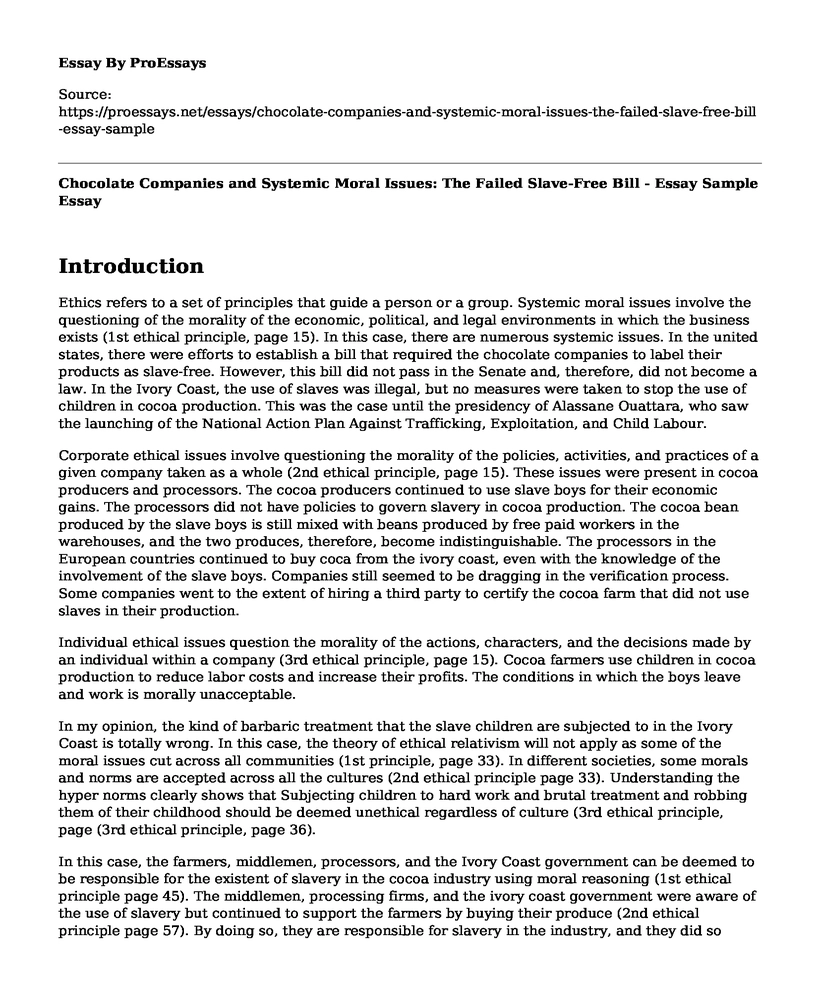Introduction
Ethics refers to a set of principles that guide a person or a group. Systemic moral issues involve the questioning of the morality of the economic, political, and legal environments in which the business exists (1st ethical principle, page 15). In this case, there are numerous systemic issues. In the united states, there were efforts to establish a bill that required the chocolate companies to label their products as slave-free. However, this bill did not pass in the Senate and, therefore, did not become a law. In the Ivory Coast, the use of slaves was illegal, but no measures were taken to stop the use of children in cocoa production. This was the case until the presidency of Alassane Ouattara, who saw the launching of the National Action Plan Against Trafficking, Exploitation, and Child Labour.
Corporate ethical issues involve questioning the morality of the policies, activities, and practices of a given company taken as a whole (2nd ethical principle, page 15). These issues were present in cocoa producers and processors. The cocoa producers continued to use slave boys for their economic gains. The processors did not have policies to govern slavery in cocoa production. The cocoa bean produced by the slave boys is still mixed with beans produced by free paid workers in the warehouses, and the two produces, therefore, become indistinguishable. The processors in the European countries continued to buy coca from the ivory coast, even with the knowledge of the involvement of the slave boys. Companies still seemed to be dragging in the verification process. Some companies went to the extent of hiring a third party to certify the cocoa farm that did not use slaves in their production.
Individual ethical issues question the morality of the actions, characters, and the decisions made by an individual within a company (3rd ethical principle, page 15). Cocoa farmers use children in cocoa production to reduce labor costs and increase their profits. The conditions in which the boys leave and work is morally unacceptable.
In my opinion, the kind of barbaric treatment that the slave children are subjected to in the Ivory Coast is totally wrong. In this case, the theory of ethical relativism will not apply as some of the moral issues cut across all communities (1st principle, page 33). In different societies, some morals and norms are accepted across all the cultures (2nd ethical principle page 33). Understanding the hyper norms clearly shows that Subjecting children to hard work and brutal treatment and robbing them of their childhood should be deemed unethical regardless of culture (3rd ethical principle, page (3rd ethical principle, page 36).
In this case, the farmers, middlemen, processors, and the Ivory Coast government can be deemed to be responsible for the existent of slavery in the cocoa industry using moral reasoning (1st ethical principle page 45). The middlemen, processing firms, and the ivory coast government were aware of the use of slavery but continued to support the farmers by buying their produce (2nd ethical principle page 57). By doing so, they are responsible for slavery in the industry, and they did so through their free will. (3rd ethical principle page 57).
Cite this page
Chocolate Companies and Systemic Moral Issues: The Failed Slave-Free Bill - Essay Sample. (2023, Jun 21). Retrieved from https://proessays.net/essays/chocolate-companies-and-systemic-moral-issues-the-failed-slave-free-bill-essay-sample
If you are the original author of this essay and no longer wish to have it published on the ProEssays website, please click below to request its removal:
- Evaluation Essay on Montage Hotels and Resorts
- The Acquisition of LinkedIn by Microsoft Paper Example
- All-Time Foodie Restaurant Business Paper Example
- NIKE Company Management - Paper Example
- Graduates Need Entrepreneurial Skills for Socio-Economic Well-Being - Essay Sample
- Essay Example on Exploring the Fast-Food Industry: From 1921 to Today
- Examining BOH Tech Utilization in US Restaurants - Essay Sample







